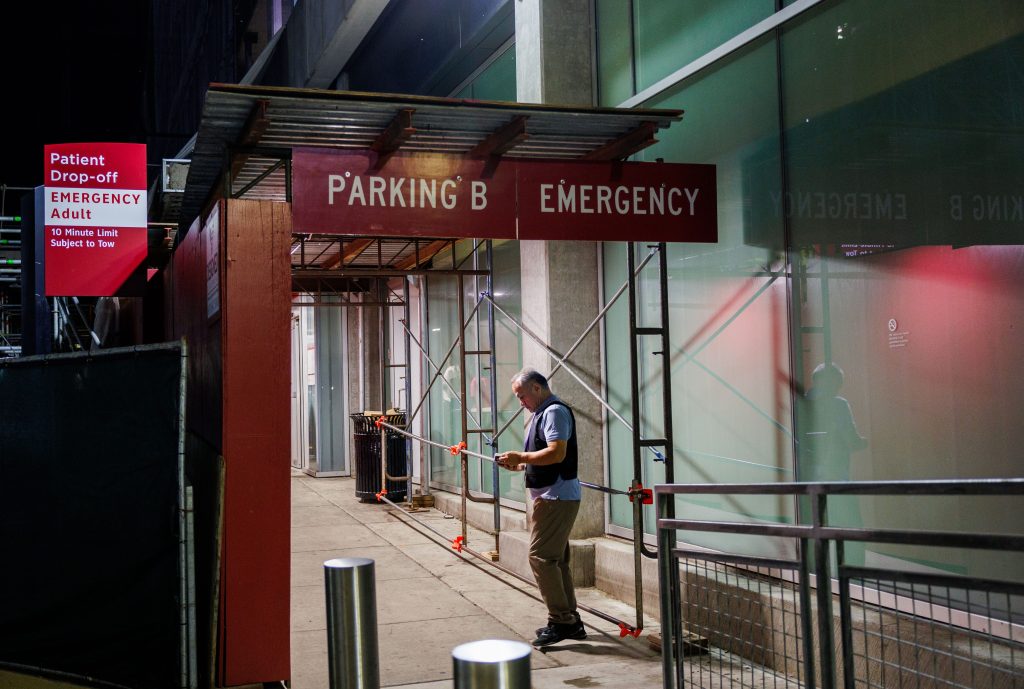About an hour and a half after a fatal shooting Wednesday night, the sidewalk outside the emergency room was starting to get crowded around Jose Hernandez.
He stood quietly as more and more people drove up and began to pace outside the University of Chicago Medical Center. The smell of cigarettes hung in the air. He scanned faces, looking for people he might recognize from the crime scene where a young man was found on a street in the Douglas neighborhood with a gunshot wound to the head.
Everyone Hernandez saw faced a long list of unknowns, about the killing itself and everything that would come next.
“People don’t know what to expect,” he said.
Hernandez is a crisis responder, whose job it is to connect with the families of homicide victims in the first blurry hours after a violent death and make sure they have help with the mountain of logistical and emotional needs that come with the killing of a loved one.
He’d been waiting for about 20 minutes when a woman in a black sweatsuit hurried down the ramp from outside the emergency room with her fingers laced together. Hernandez approached, offered a handshake and then a business card and spoke quietly for a few minutes.
The woman took the card and thanked him. She was an aunt of the gunshot victim, and ticked through a long list of deaths the family had recently endured.
Chicago is currently seeing a drop in violent crime. But one night last week alone Chicago counted nine new gunshot victims, including the man whose family was waiting outside the emergency room with Hernandez.
And while supporting the people closest to victims of violence is one of the most important ways to prevent further violence, advocates and doctors fear that expiring pandemic-era relief funds, uncertainty around federal support and Chicago and Illinois’ own shaky finances will eat away at the city’s progress in reducing violence. Hernandez’s organization, facing a funding shortfall from both state and city sources, has been slowly laying off employees and thinning its manpower on every shift.
Once Hernandez meets the survivors of a homicide victim, he typically goes with them to the morgue while they identify their loved one’s body and offers help with funeral arrangements. He also gets families started on a stack of paperwork and managing ambulance bills, applications for city and state reimbursements for victims of crime. Then one of his colleagues in another part of the organization, Chicago Survivors, takes over coordinating longer-term financial planning and support, mental health assistance and other efforts to help the family stabilize themselves.
Elected officials and private-sector leaders have gone in big for hyperlocal violence interventions over the last several years, particularly on strategies such as street outreach and “peacekeeping,” which leverages relationships of people very close to street violence as a way to prevent further conflicts. Serving families in the wake of a homicide has historically been considered an extension or complement to the work of violence intervention.
But University of Chicago Trauma Center Director Selwyn Rogers said that in a world where people who have previously been exposed to gun violence are at greater risk of becoming victims themselves, follow-up support for families suffering from violent loss is itself a preventive measure.
“It’s not just when a bullet leaves a chamber and does harm to a human that leads to death and then the death is over, and that’s it,” he said. “It actually has reverberating effects for everyone.”
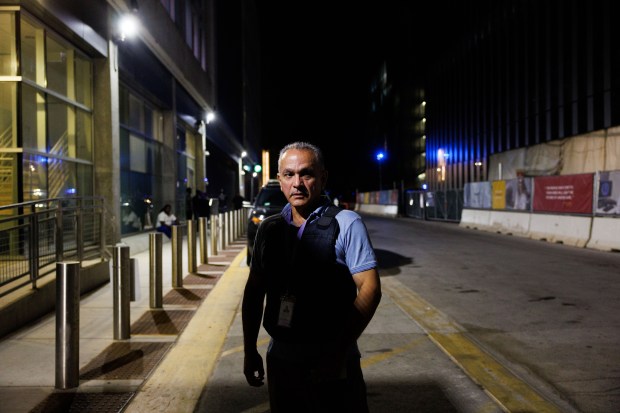 Crisis responder Jose Hernadez waits to talk with family members after a 27-year-old man was fatally shot near the 3500 block of South Rhodes and brought to the University of Chicago Medical Center on Aug. 6, 2025, in Chicago. (Armando L. Sanchez/Chicago Tribune)
Crisis responder Jose Hernadez waits to talk with family members after a 27-year-old man was fatally shot near the 3500 block of South Rhodes and brought to the University of Chicago Medical Center on Aug. 6, 2025, in Chicago. (Armando L. Sanchez/Chicago Tribune)
At Chicago Survivors, advocates fear that if they are forced to compromise services for families who in many cases are already fighting to survive, violence will begin to metastasize again.
‘A severe blow’
Until recently, JaShawn Hill, the group’s executive director, had hoped that the organization would be able to expand its reach over the next year. They’d asked for $4 million from Springfield at the start of the 2025-26 budgeting process, double what they received last year.
They had planned to expand their youth clinical care services and to put more staff in Chicago Public Schools. They’d hoped to start operating in the suburbs, which tend to have less infrastructure to prevent and respond to violence, and continue working with Chicago Police Department detectives and families toward closing cold case investigations.
This year, Illinois lawmakers gave the organization $1 million in the recently passed budget in a year when expiring federal funds and a projected budget shortfall led to reductions for many other groups as well. About $500,000 in American Rescue Plan funding, given out through the city, is also set to expire Dec. 31.
Hill said there were promising options for the future, if the organization can make it through the next year. Cook County officials late last month announced $25 million in grant funding for gun violence prevention, of which $5 million is earmarked for survivors of gun violence victims.
For now, the group is being forced to lay off staffers a handful at a time. As of Friday, they’d eliminated jobs for three crisis responders, three family support workers and an advocate who worked out of the Leighton Criminal Court Building. Hill said they expect to cut three more jobs later in August.
Remaining workers are staffing their shifts alone, Director of Crisis Response Frank Luera said. That means when multiple homicides take place in a short time frame, they can’t spend as much time with survivor families in the first hours after a killing and that longer-term support workers take longer to get people the help they need.
“Cases get backed up, and then families have to find their way without any support or anybody telling them about what their next steps are or what’s available to them,” he said. “(And then) they’ll tend to isolate, which makes our job even harder.”
Less city funding
A representative of the city’s Department of Public Health, whose money has in part been supporting Chicago Survivors, said in a statement that ARPA money accounted for 40% of the department’s violence prevention money.
“While the loss of these funds at the end of 2025 will deal a severe blow, we remain optimistic that critical services in priority communities most impacted by violence will continue,” the statement read.
The city recently wrapped up two bidding processes for new violence prevention contracts, including one for services nearly identical to what Chicago Survivors offers — among them immediate crisis response, hospital morgue visits, counseling and help with reimbursement paperwork.
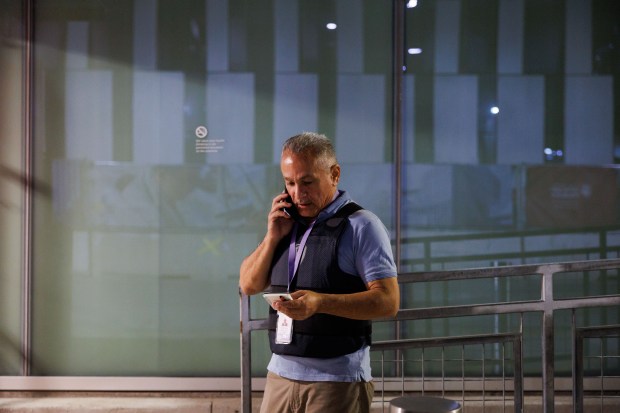 Crisis responder Jose Hernandez waits to talk with family members after a 27-year-old man was fatally shot near the 3500 block of South Rhodes and brought to the University of Chicago Medical Center on Aug. 6, 2025, in Chicago. (Armando L. Sanchez/Chicago Tribune)
Crisis responder Jose Hernandez waits to talk with family members after a 27-year-old man was fatally shot near the 3500 block of South Rhodes and brought to the University of Chicago Medical Center on Aug. 6, 2025, in Chicago. (Armando L. Sanchez/Chicago Tribune)
But Hill said her group wasn’t eligible for those contracts because they were geared toward more neighborhood-based organizations, not citywide work.
Hill said that while they have considered their work an extension of and complement to community violence intervention, they’ll be making the case going forward that they are “part of the fabric.”
Rogers, of the U. of C. trauma center, said the logistical help that those groups provide — whether they’re independent like Chicago Survivors or based in a hospital like the University of Chicago Violence Recovery specialists — is critical for people who are overwhelmed in the first few weeks after a family member is killed. But even more important, he said, was helping survivors figure out how to think about the death going forward.
“How do you deal with a 17-year-old who went to a party and they’re now dead?” he said. “We don’t do a good job dealing with the psychological, emotional, spiritual needs of (people who are) left behind.”
The grief remains
Maria Pike hurried out of her Pilsen two-flat and stood under the streetlights, looking for the moon. Buckets of sunflowers and orange roses waited inside her navy blue minivan across the street. Pike got in the minivan and turned east down 18th Street.
She sped north on the Kennedy. She hadn’t counted on the Armitage exit being closed for construction, but it was OK. As long as she reached Logan Square before 4:50 a.m. she would be happy.
Off the expressway, west on Fullerton, south on Drake and east again on Palmer to North St. Louis Avenue where, 13 years ago at that time, her son had been killed.
Pike was “walking like a zombie” a few days later when a woman she’d never met called to offer help.
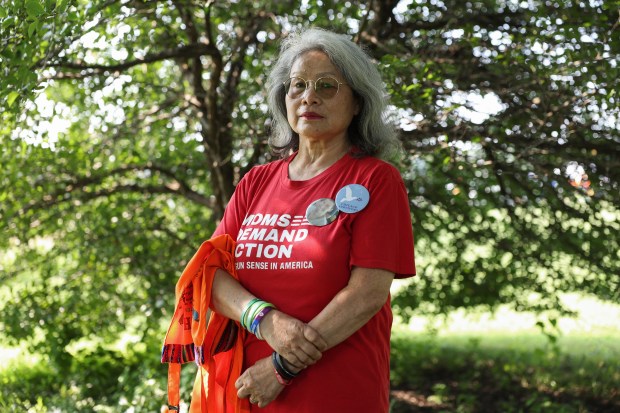 Maria Pike, a gun violence survivor advocate, during a National Night Out event at Ogden Park in the Englewood neighborhood of Chicago on Aug. 5, 2025. Pike’s son was fatally shot in 2012. (John J. Kim/Chicago Tribune)
Maria Pike, a gun violence survivor advocate, during a National Night Out event at Ogden Park in the Englewood neighborhood of Chicago on Aug. 5, 2025. Pike’s son was fatally shot in 2012. (John J. Kim/Chicago Tribune)
The woman on the phone said her son, Frankie Valencia, had been a close friend of Pike’s son, Ricky. Valencia had been killed in 2009, before Ricky Pike and his parents had thrown themselves into organizing aid for other families of homicide victims in an informal network of logistical help, money for flowers or transportation and other support.
She didn’t want help at first. But later found herself getting involved with the network of families, then known as Chicago Citizens for Change. She learned how to arrange meetings with police, how to canvass neighborhoods, how to organize trips to the morgue.
She used to plaster the blocks in Logan Square with signs seeking information about her son’s killer. Residents would only speak to her in secret, she remembered, knowing which street gang had been involved in his death.
Her son’s murder case wound its way through the court system, leading to a conviction and then a new trial and eventually a release for the man convicted.
As time has gone on, she has poured herself more and more into advocacy around restorative justice, gun violence and community service in neighborhoods all over Chicago. She has learned all about the social factors that lead people to hurt or kill others and wants to see families have the chance to “grow from grief,” which she sees as the reverse to the chaos and instability violence wreaks.
“We don’t care who you are, where you come from, what race you are, what you did or did not do,” she said. “What matters is that you are dead and somebody loves you. And that somebody is going to have to live with the consequences of grief.”
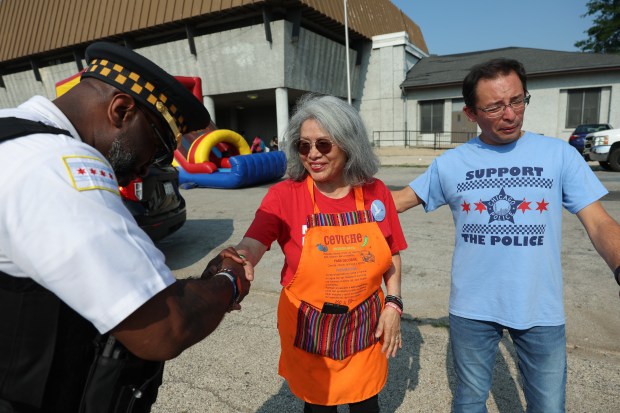 Maria Pike, a gun violence survivor advocate, is greeted by a police supervisor and Ald. Raymond Lopez, 15th, during a National Night Out event at Ogden Park in the Englewood neighborhood of Chicago on Aug. 5, 2025. (John J. Kim/Chicago Tribune)
Maria Pike, a gun violence survivor advocate, is greeted by a police supervisor and Ald. Raymond Lopez, 15th, during a National Night Out event at Ogden Park in the Englewood neighborhood of Chicago on Aug. 5, 2025. (John J. Kim/Chicago Tribune)
Each year the site of Ricky Pike’s killing is a little further removed from what it was in the early hours of Aug. 3, 2012, when police found him and a friend shot in a dark green Geo Prizm. The pink-painted trees that used to mark Imperial Gangsters territory are gone. The homes are nicer.
Chicago Citizens for Change became Chicago Survivors, where Maria Pike is now a board member and which last year aided families of 425 homicides around the city.
“We are the small engine that can,” Pike said. “Or, we were.”
Pike gestured to a few feet of curb near the entrance to an alley, about halfway down the 2100 block of North St. Louis Avenue.
“This is where it happened,” she said.
Pike took bundles of orange roses from the minivan, along with a black plastic bucket, scissors, a few lengths of orange fabric and several water bottles. The roses needed to be cut to a few different lengths. She placed the bucket at the foot of a nearby tree and emptied the bottles of water into it. Then she filled it with a sunburst of roses.
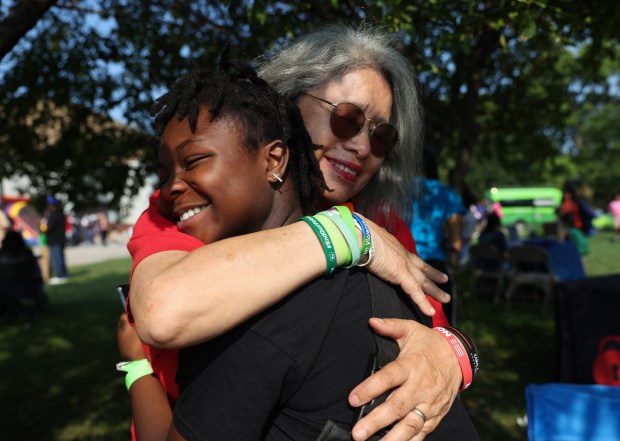 Leah Tucker, 13, is hugged by Maria Pike, a gun violence survivor advocate, during a National Night Out event at Ogden Park in the Englewood neighborhood, Aug. 5, 2025. (John J. Kim/Chicago Tribune)
Leah Tucker, 13, is hugged by Maria Pike, a gun violence survivor advocate, during a National Night Out event at Ogden Park in the Englewood neighborhood, Aug. 5, 2025. (John J. Kim/Chicago Tribune)
She took out a laminated sign and struggled for a moment to tie it to the tree.
She straightened up and stepped back. She bowed her head, clasped her hands in front of her and stood still for several minutes in front of that tree on North St. Louis Avenue. The sun had not yet begun to rise.
The sign read “Take a Rose,” or several to share with friends and neighbors. It notified readers that Ricky Pike had been killed a few feet away on that spot 13 years ago and quoted a friend’s saying at his funeral — that he had been a summer in their lives. It asked readers to attempt to reverse violence and “spread the love as it is love that makes us children of God.”
When Maria Pike goes, she wants to make sure her son knows she tried her best to do it herself.
